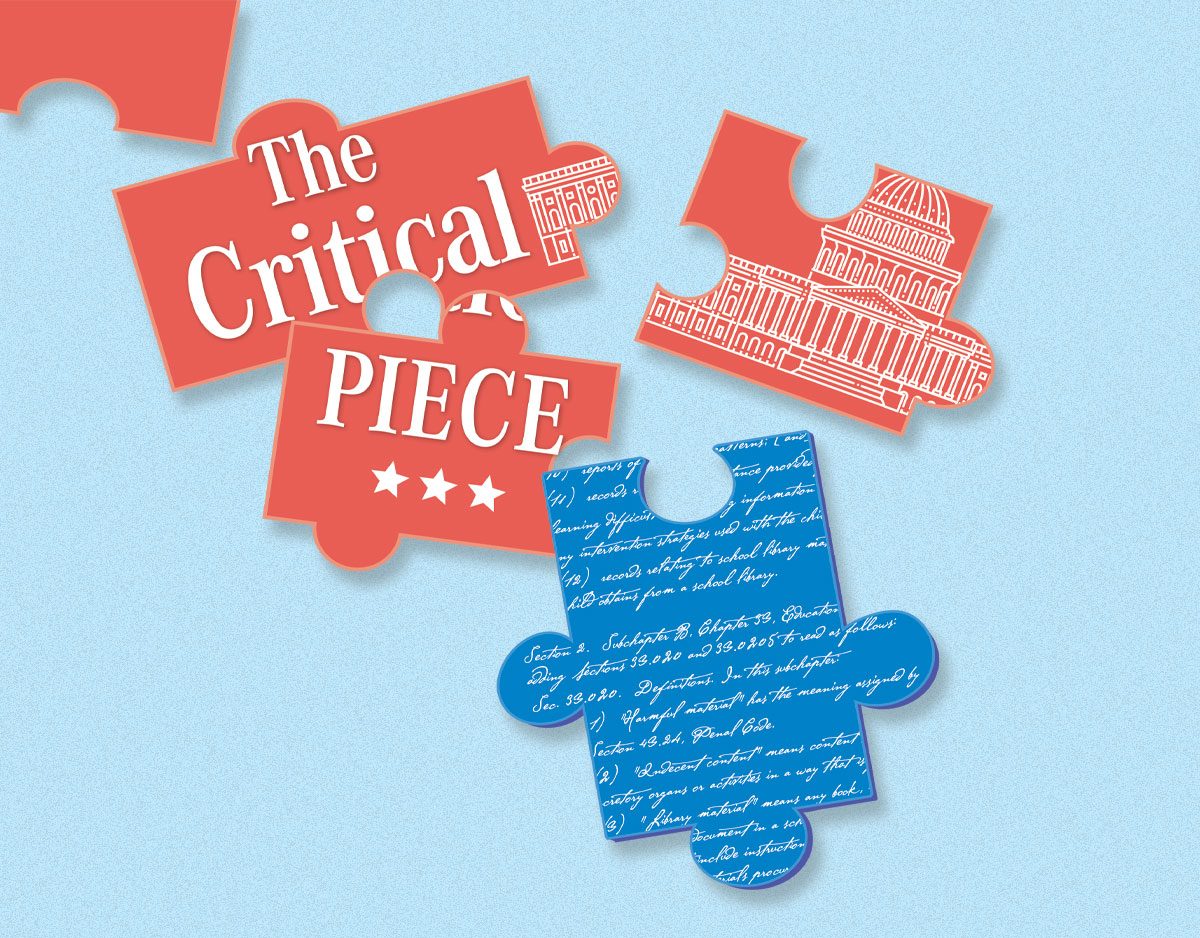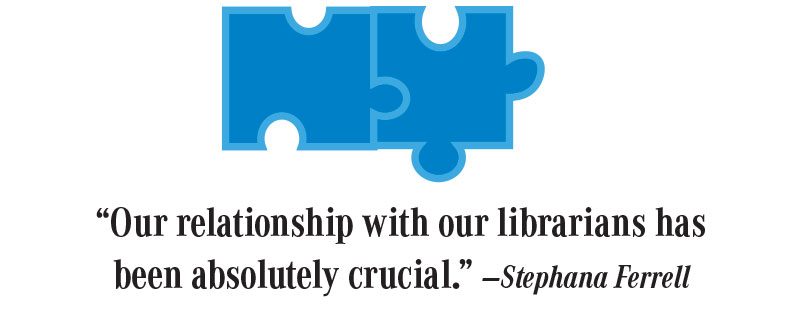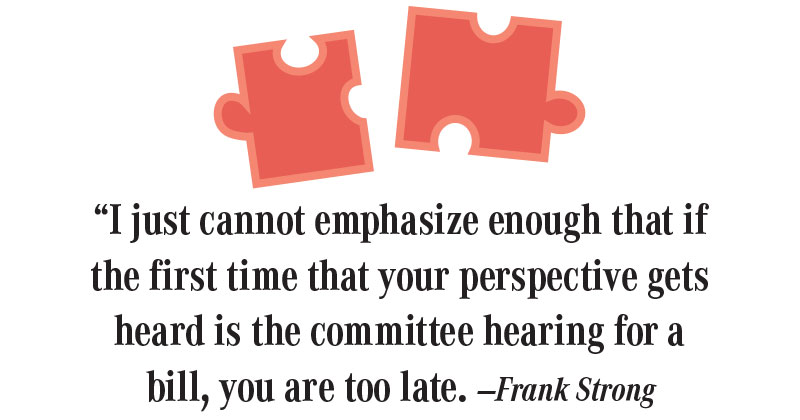Library Advocacy Requires a Voice in the Legislative Process
Having a say in legislation is a critical piece of advocacy right now. Hear from experts on how to help grassroots organizations, testify before boards and legislators, and make an impact.
 |
SLJ montage. Building illustration by GreenTana/Getty Images. |
Library advocacy has always been about sharing stories—the stories of what happens in the library, the impact of books and programs on individual students and patrons, and libraries’ broader role in impacting literacy and school culture. This narrative was meant to convince decision-makers that programs should be funded and libraries staffed with qualified professionals.
Now, however, advocacy must be more than a megaphone and a good story. Libraries and librarians—and the core values of the profession—are under attack, and the response must be strategic and politically savvy. It requires “policy depth,” according to EveryLibrary executive director John Chrastka.
Blocking anti-library bills and promoting those that further the profession requires librarians and library advocates to employ strategic messaging that centers public policy and education policy, Chrastka told attendees at the SLJ webcast “Librarians, Legislation, and Media Training” on August 22.
“Policy depth conveys seriousness,” said Chrastka. “Legislators and their staff prefer to collaborate with stakeholders who understand the mechanics of government, not just how communities feel.”
Individuals and organizations are out there doing the work, talking about policy, creating briefs, testifying before legislators, speaking at school and library board meetings, working with coalitions, and building relationships with the proper stakeholders and decision-makers to have the biggest impact.
In the August webcast, SLJ hosted experts in this type of advocacy. Panelists shared their expertise on tracking legislation, testifying, building relationships, crafting the proper message, and how librarians can help even if they can’t participate openly in the process.

Tracking
Knowing what legislation is being proposed and how to track it is the first step. Stephana Ferrell, cofounder of Florida Freedom to Read Project, and Frank Strong, codirector of Texas Freedom to Read Project, spoke about their process for tracking and responding to legislation. It starts before a bill is even proposed.
Learn the legislative calendar and research legislators to know who will support libraries and who seeks to target them, and reach out to them between sessions, Ferrell and Strong advised. This is where librarians who may not be willing or able to speak publicly or testify can make a big impact. Look for delegation meetings, office hours, and town halls.
“This is the best time to actually reach out,” said Ferrell. “It’s a great time to speak and share your concerns—what you want and what you would like to see changed. If there have been bad bills passed, they need to know how [that] policy has impacted what you do.”
|
|
Bring data
Ferrell suggests putting together a “one-pager” of information on the issue and its impact, as well as bringing testimonials from those the legislation could have or has impacted.
“We have been updating the same statutes every single year, and through the public records process, we have been able to obtain a lot of information about how those policies have actually been put into action,” Ferrell said. “What the legislators say when they pass the bill isn’t actually what happens on the ground. So, it’s really important that they have this information. They find it valuable to informing the work that they do.”
In Texas, between sessions, there are interim hearings and committee meetings.
“That is really an important stage-setting moment,” said Strong. “It certainly was something that, in Texas, the other side took advantage of, and we were sort of caught flat-footed when they held an interim hearing on books and set the narrative that then moved forward into the legislative session.”
Strong also recommends finding out about any party conventions or meetings where they will set priorities and provide a preview of the upcoming session. Building relationships with legislators and their staff before they are in session is vital for success.
“I just cannot emphasize enough that if the first time that your perspective gets heard is the committee hearing for a bill, you are too late,” Strong said.
Once the session starts and bills drop, it’s time to track and react where necessary. For Ferrell and Strong, tracking legislation begins with searches of their state’s house and senate websites. Searching not just for “library” or “education” but terms like “obscenity” and “harmful to minors”—as well as by the specific statute number that they know might be targeted, such as the statute about book challenges—Ferrell and Strong then set alerts to receive email updates when the bills move through the process. Strong also searches by legislator name, knowing who might be more likely to file an anti-library bill.
While they use free state government sites, there are also websites that track legislation in all 50 states and can provide the service for a cost, such as BillTrack50 (billtrack50.com) and LegiScan (legiscan.com).
It can be difficult to know which bills will get enough support to move forward and where to focus your efforts, but relationships with staffers and experience help refine that process.
During the legislative session, Strong and his fellow advocates continue to speak to lawmakers and specific committee members to share their specific concerns about certain bills. They talk to staff to learn which bills have the most support, and they provide a consistent message to legislators throughout the process. Never assume people know about the topic and its practical impact, said Strong, and never assume a bill is dead until it is actually dead.
Testifying
When the hearings and committee meetings start, librarians and library advocates often step up to testify. During the webcast, Lynette Mejía, cofounder of Louisiana Citizens Against Censorship, and Millie Bennett of Diversity Awareness Youth Literacy Organization (DAYLO), a student advocacy group in South Carolina, spoke about testifying, sharing lessons they have learned from the last few years.
“It was a steep learning curve,” said Mejía. “In the beginning, we were all fired up about these bills that had shown up in our legislature for the first time, and so we ran down there in a big herd to testify and explain to them how bad these [bills] are. But what we learned very quickly is that there’s a lot more subtlety and strategy that go into deciding who should testify, what they should testify about, and how specifically to attack the weaknesses in the bill so that legislators who may not know a lot about this issue will be convinced.”
Tailoring the testimony to the bill is key, as is having school and public librarians, when possible, speak to the specific impact the bill will have on their work. And, most importantly, knowing which aspects will best influence the legislators.
“We’re so passionate about this issue,” said Mejía. “But from a legislator’s point of view, they’re looking at things like fiscal impact, they’re looking at feasibility, they’re looking at lawsuits down the road, these really practical aspects of what these bills mean.”
Advocates have to be almost clinical at times, she said. And sometimes, Mejía has learned, it’s best not to speak at all, such as in the case of a bad library bill that, after discussion, legislators planned to withdraw to rework and bring back later.
“It was a win,” said Mejía. “We should have just let it go, but we were all excited, and we were all interested in making sure that our voices were heard as part of the deliberative process. When they called for speakers, we should have passed, and we did not. We went up there one at a time and gave our testimony, very respectfully. But the people who were on the committee who were adamantly anti-library, adamantly pro–book ban, it just made them really angry.”
That anger changed the course of the bill, with the committee members moving the bill out of committee instead of withdrawing it.

Advice for students
Part of coming up with the correct strategy is looking around at the coalition partners and seeing who fits the specific purpose best. In some cases, the voices that need to be heard belong to students.
Bennett is one of those young people. Now a junior in college, as a high school senior, she found her way to anti-censorship activism after learning about book ban attempts from her AP English teacher. Educators advising students who want to advocate for the freedom to read can provide guidance and support, and remind kids that people want to hear from them and that they don’t have to take it on alone, Bennet said.
“Never go it alone—and you are never alone in it,” she said. “I was part of a big group of students working together. We were a book club, and our AP teachers and our peer advisors and peer mentors would go with us to school board meetings, help us write our statements, and get the word out to the community. It was really just six of us testifying my senior year of high school, but the community came out in droves.”
Showing board members and legislators that library advocates are a sizeable faction is important, no matter how many people speak. And for those unable or unwilling to speak, showing up is an important part of advocacy.
“The little trick about wearing the same color shirt, it sounds silly, but it works,” said Mejía. “We’re facing the legislative committee, and when they look out in the audience and they see that the room is overwhelmingly filled with pro-library people, that kind of makes them think about what they say, and think, ‘Okay, people care about this. Maybe I should take a closer look at it.’ ”
Behind the scenes
In Florida and Texas, librarians have been “invaluable,” providing grassroots advocates with the information they need without having to step into the spotlight themselves, according to Ferrell.
“Our relationship with our librarians has been absolutely crucial,” she said, noting they use librarian reports for Freedom of Information requests and to inform policy suggestions and responses. “When we create our one-pagers, we run it by the members of FAME [Florida Association for Media in Education] that are actively involved with the work that we do, because we want to make sure what we’re suggesting as parents is also workable and makes sense.”
In Texas, even after Senate Bill 13 passed, putting collection development decisions in the hands of advisory councils instead of librarians, Strong said that getting reports from librarians about how the law is impacting their day-to-day is key to trying to create change.
“We have librarians and teachers emailing us every day saying, ‘This is what has happened in my classroom library,’ ‘This is what has happened to my library budget.’ That allows us to do that work in the interim session. In the last interim session people said HB 900—the previous library bill—wasn’t having any effect. It was really important for us to have that data to be able to say, ‘No, in fact, all of these schools are removing all of these books as a result of HB 900, and all of these classroom shelves are being emptied.’ ”
Many might think it’s too late. The bill became law. But for Strong, the fight never ends even when a bill is passed. He needs this information, he said, “for accountability and for what could come down the pike next.”
RELATED
The job outlook in 2030: Librarians will be in demand
The job outlook in 2030: Librarians will be in demand
ALREADY A SUBSCRIBER? LOG IN
We are currently offering this content for free. Sign up now to activate your personal profile, where you can save articles for future viewing







Add Comment :-
Be the first reader to comment.
Comment Policy:
Comment should not be empty !!!